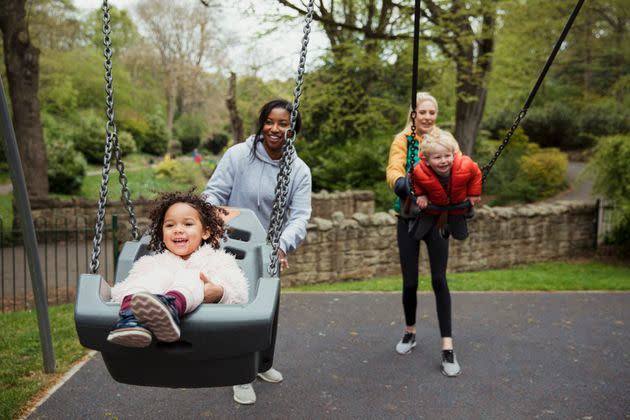New Data Reveals The Unexpected Feeling 66% Of Parents Experience Regularly

Like most parents of young children, Anne Helms juggles a lot of responsibilities throughout the day. She works full time in human resources for Ohio State University and cares for her 6-year-old son and 3-year-old daughter.
“We’re in the throes of it, that’s for sure,” Helms told HuffPost.
Yet, in spite of spending every hour of the day with her children, husband, co-workers, sisters or friends, Helms realized that she was experiencing a parent-specific variety of loneliness.
“I have all these people around me,” she explained. “I wasn’t lonely in the traditional definition.”
But when it came to parenting struggles, such as her son’s resistance to riding the school bus to kindergarten, Helms felt “like I was the only one thinking so deeply into certain aspects of parenting.” Her husband was confident that their son would figure out his fear of riding the bus, but instead of feeling reassured by this, Helms felt alone in her anxiety.
It turns out that a majority of parents have experienced this sense of isolation. In a recent poll conducted by Ohio State University, 66% of parents reported that they sometimes or frequently feel isolated or lonely when facing the demands of parenthood. In addition, 62% said they felt burned out, and 38% felt that they didn’t have anyone to support them in their parenting role.
It isn’t necessarily the lack of interactions in parents’ lives that causes the feeling of isolation — although it can indeed be isolating when your only conversation partner for the day is a toddler — but rather the types of interactions that parents are having.
“We have all been in a situation where we have been in a room full of people and still felt lonely,” Kate Gawlik, a professor at the Ohio State College of Nursing, told HuffPost. “Conversations with our children are very different from our conversations with other adults, and as parents, we need both.”
Interactions at work don’t always fit the bill, either. Helms, like many workers these days, frequently works from home. She says that conversations tend to be task-focused, with small talk remaining rote.
“Another thing that I’m conditioned to do is have a generic response. So if someone asks me, ‘Hi, how are you?’ I’m always saying, ‘I’m great. How are you?’” she said.
Helms found an opportunity to get away from this automatic type of response in a positive parenting group facilitated by Gawlik at Ohio State. The group met for six weeks. Each session had its own topic but also included time for participants to speak about their current parenting challenges. Helms said that with Gawlik’s lead, she felt like she had access to a “parenting expert,” although the way the group worked involved tapping into the “expertise” of each parent participant.
When Helms opened up about her son’s difficulties boarding the school bus, for example, other members in the group shared similar experiences and offered tips about what had worked for them.
“I felt validated. I felt like I wasn’t alone in that moment,” Helms said.
The Epidemic Of Loneliness
Parents aren’t the only ones experiencing loneliness at an alarming rate. In 2023, Surgeon General Vivek Murthy issued an advisory report outlining the prevalence and dangers of our nation’s “epidemic of loneliness,” as well as potential solutions.
About half of U.S. adults said they experience loneliness, the report on the Ohio State poll explained, and this number was even higher among young adults. In comparison, as the report mentions, this rate is higher than for other health risks, such as smoking (12.5%) and diabetes (14.7%).
This means the 66% of parents who reported loneliness in the survey is significantly higher than for adults in the same age brackets who are not parents. What’s striking about this is that most parents are never alone. Even in the middle of the night, they’re just one bad dream away from being called to duty.
The number also speaks to how much pressure parents feel not to “crack” or admit to how much they are struggling.
“There’s a lot of times where I think parents sometimes want help but don’t want to be put on display or don’t want to be shamed or made to feel like they’re doing it wrong, and so that might even compound isolation,” Mercedes Samudio, a licensed social worker and author of “Shameproof Parenting,” told HuffPost.
The times we’re living in are also playing their part. “Technology and the pandemic have had a lasting impact on the ways we live and work,” Gawlik said.
“We got really isolated during the pandemic, so that meant that a lot of people’s support systems kind of fell away,” Samudio said. Many workers still work remotely since COVID lockdowns began, and while this can help parents meet child care obligations, it can reduce opportunities to connect with co-workers as well.
Connecting outside of work isn’t always easy. “We have less extended family support as we live in a society where many of us live far from relatives,” Gawlik said. “Many communities have experienced a breakdown in traditional social networks. Factors like increased mobility, longer work hours and suburbanization have weakened the sense of community in some areas.”
Although we’re all virtually connected to others day in and day out via our smartphones, this type of connection can lack the depth and honesty needed to combat feelings of isolation.
“As much as I am a proponent of using technology to connect, I think technology also is a way to disconnect, because you can reach out to people without really reaching out,” Samudio said. We might see someone’s posts on social media, for example, and assume that they are doing well — not knowing that this public face doesn’t reflect what’s actually going on in their lives.
“Our basic human need for emotional intimacy cannot be met this way,” Gawlik said of the reliance on smartphones and social media.
It’s not hard to imagine a parent slipping out of their child’s bedroom at night after finally getting them to sleep. Exhausted, craving a break, they pick up their phone to check for messages, only to slide into a long scroll on social media, where curated photographs of other people’s virtuous and cooperative children leave them feeling as if, clearly, they are doing this whole parenting thing wrong — and become more alone than ever.

The Health Risks Of Loneliness, And How Parents Can Combat Isolation
The repercussions of loneliness extend beyond the emotional, affecting physical health as well.
Murthy’s 2023 report mentions that loneliness correlates with a greater risk of cardiovascular disease, dementia, stroke, depression, anxiety and premature death. One study even found that prolonged periods of loneliness increased premature mortality risk as much as smoking up to 15 cigarettes per day. It hastens death even more than physical inactivity.
Though her husband, sisters and friends are all supportive, Helms said, the structured nature of the parenting group provided her with something she had been missing: a regular opportunity to articulate and troubleshoot her parenting challenges.
To a parent who is struggling with loneliness, isolation or burnout, Helms said she would advise looking in the community for opportunities to connect with other parents. She encourages people to “be brave and be authentic and share how you’re truly feeling.”
It takes courage to admit that you’re struggling with something, particularly when social media posts make it look like everyone else has it all figured out.
“I think parents sometimes want help but don’t want to be put on display or don’t want to be shamed or made to feel like they’re doing it wrong,” Samudio said.
She recommended that parents first show themselves some empathy. Parenting is hard. Helms also recalled that in the parenting group, Gawlik at one point “said something along the lines of, ‘It would be expected that someone would be burned out as a parent, if you are working full time and you’re a conscientious parent. ... How could you not feel burned out at some moment?’”
Hearing this, “I felt a weight lifted off of me,” Helms said.
From this place of empathy, Samudio recommends thinking carefully about your needs.
“It’s really good for parents to slow down to say, ‘What do I really need?’ Is it parenting help, or is it companionship or is it feeling back to my old self?” The answer might be a parenting group, reconnecting with old friends or finding time to devote to an activity that brings you joy.
Helms said that some of the things she does for self-care include working out and engaging in arts and crafts, with her kids or on her own.
“You can’t pour from an empty cup,” she said.
Though some loneliness is to be expected if you’re a parent, Gawlik emphasized that “if the loneliness is chronic, severe or interfering with the ability to function or parent, it is time to take action.”
She suggested reaching out to a “family member, friend or other support person.”
“If you feel that you don’t have a good support person or network, it is never too late to find one,” Gawlik said. Parenting groups are one option, as are other parent-child classes or activities, such as library story time.
As with any other health intervention, you may have to wait a bit before you notice results.
“Anything new can be difficult and intimidating at first, so don’t be surprised if you feel nervous the first couple of times you attend,” Gawlik said. “Remember that relationships are built on seeing the same people multiple times.”
